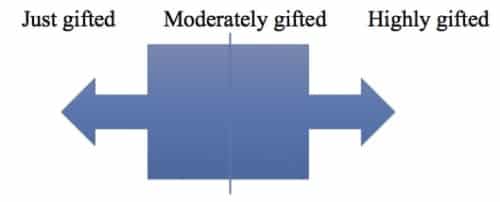Or Do They Serve the Needs of Special Learners?
by Todd Stanley
 Are gifted programs elitist? This is a criticism leveled upon gifted and talented programs. Some perceive because children are treated differently, with services designed to their specific learning needs, this means they are receiving special treatment. That is certainly one way to look at it. Another, more logical way to look at it is that special education children are treated differently, with services designed to meet their specific learning needs. No one would accuse special education of being elitist. So why the double standard?
Are gifted programs elitist? This is a criticism leveled upon gifted and talented programs. Some perceive because children are treated differently, with services designed to their specific learning needs, this means they are receiving special treatment. That is certainly one way to look at it. Another, more logical way to look at it is that special education children are treated differently, with services designed to meet their specific learning needs. No one would accuse special education of being elitist. So why the double standard?
The definition of elitist is a class of persons considered “superior” by others or by themselves.
Just the fact that children who achieve gifted identification in cognitive skills are labeled “superior cognitive” instantly puts a target on their backs. What can add to this is the way a district decides to provide gifted services. There is no one prescribed way to offer services. If a school decides to use inclusion where the teacher simply differentiates the curriculum, because the service is not as obvious, it usually avoids being labeled elitist. The one that receives the most scrutiny is the self-contained class of gifted students. This usually involves pulling kids from regular classes and putting all of them in one classroom. It is this pulling the supposed best of the best and putting them all together in one place that causes people to label it elitist. How is this fair to teachers who are left with only the students who were not smart enough to qualify? How is this fair to students who do not qualify for the program? By identifying children as gifted, you are identifying the other children as non-gifted. What effect does this have on the psyche of a child, to be told she is not good enough?
I am here to assuage these concerns and lay out why gifted programs are not elitist. When you have a vast variety of abilities in the classroom, it can be very difficult to meet all of the students’ needs. A student with an 80 IQ and a student with a 130 IQ are going to have a much different approach to a lesson. We challenge teachers with simply differentiating in the classroom, a magical term that means to tailor the lesson to fit each of their levels. There are some teachers who are very skilled at differentiating in the classroom, but most times what ends up happening is the teacher teaches to the middle. This is what it looks like in a regular classroom:

Notice the special education and gifted students begin to get pulled thin while the majority of learning is going in the middle. Hardly fair to either group. If you group students of higher ability together in one place, the spectrum looks like this:

There is still differentiation to be done. After all, if a student has a 130 IQ (considered to be superior cognitive in most cases) and another has a 160 IQ (rare but happens), those students have just as large a gap between them as the 130 student and one with a 100 IQ. Having students grouped who are at least similar in ability makes it easier for a teacher to create a classroom that will challenge everyone at the level they are capable. Programming is never designed to be elitist by excluding a student or including someone because of qualities other than his or her abilities.
 The problem is not the programming itself, but rather the criteria used to place students in that programming. Some programs have criteria that is going to give some students an advantage while excluding others. For instance, if the program requires a parent request, those students whose parents are heavily involved in their child’s life are going to get into the program while a child whose parents are not as involved or do not understand the process, is going to be left out. This is an example of elitism; or if part of the criteria is based on teacher recommendation and/or grades. Grades and teachers’ opinions are both very subjective. And there are teachers who give poor grades to students based on not turning in homework or being a behavior problem, not based on their ability or their mastery of the content. Gifted children are not always compliant children. They might be acting out because they are bored in class.
The problem is not the programming itself, but rather the criteria used to place students in that programming. Some programs have criteria that is going to give some students an advantage while excluding others. For instance, if the program requires a parent request, those students whose parents are heavily involved in their child’s life are going to get into the program while a child whose parents are not as involved or do not understand the process, is going to be left out. This is an example of elitism; or if part of the criteria is based on teacher recommendation and/or grades. Grades and teachers’ opinions are both very subjective. And there are teachers who give poor grades to students based on not turning in homework or being a behavior problem, not based on their ability or their mastery of the content. Gifted children are not always compliant children. They might be acting out because they are bored in class.
The way to combat this elitism is to have a process for selection that is as objective as possible. It needs to be based on ability rather than behavior. The use of a nationally normed test to identify gifted students using clear criteria is one of the more objective ways to determine placement in gifted programming. Unfortunately, what this process leaves out is a student motivation and work ethic. Any teacher worth her salt knows such qualities will take a student pretty far. In fact, given a student of high ability who does not give much effort and a student of above average ability who works diligently, the latter will probably find more success. However, gifted programs are not about successful children. Gifted programs are about students with a specific need.
 I would be remiss if I did not scrutinize the nationally normed tests themselves. There are those who point to the fact that these tests are biased in their identification. There is an over-representation of higher socio-economic white children in gifted programming, meaning there is an under-representation of minority and/or lower socio-economic children. Part of the issue is that the tests are written in a language that is more familiar to those who are exposed to it on a regular basis. Not only this, children from a higher socio-economic status tend to have more exposure to experiences which can give them knowledge others were not privy to. This can give some children an advantage on the tests, especially the younger grades.
I would be remiss if I did not scrutinize the nationally normed tests themselves. There are those who point to the fact that these tests are biased in their identification. There is an over-representation of higher socio-economic white children in gifted programming, meaning there is an under-representation of minority and/or lower socio-economic children. Part of the issue is that the tests are written in a language that is more familiar to those who are exposed to it on a regular basis. Not only this, children from a higher socio-economic status tend to have more exposure to experiences which can give them knowledge others were not privy to. This can give some children an advantage on the tests, especially the younger grades.
Where the elitist label can also come from is the value that parents put on acceptance into the program. It becomes a badge of honor. If your kid is in, then you are more socially accepted. I cannot tell you how many times a parent has told me when finding out their child missed the cut score for gifted programming how they think an exception should be made because they do not want their child with those “other” children. That is certainly elitist, thinking your child is better than another child. It would especially be elitist if the district were to acquiesce to this parent and put her child in the gifted program just because parents think he ought to be. Gifted students are not better than other children. They just have a higher ability to think.
 The truth is, gifted programs are as elitist as we allow them to be. By making sure our gifted programs selection is objective and making efforts to test students with a variety of methods in order to properly identify all students, we create programming that fits an ability, not a social status. This prevents them from being elitist and instead makes them what they were meant to be; a specific service for students with extraordinary ability.
The truth is, gifted programs are as elitist as we allow them to be. By making sure our gifted programs selection is objective and making efforts to test students with a variety of methods in order to properly identify all students, we create programming that fits an ability, not a social status. This prevents them from being elitist and instead makes them what they were meant to be; a specific service for students with extraordinary ability.
Author
Todd Stanley is the author of several education books including Project-Based Learning for Gifted Students and Performance-Based Assessment for 21st-Century Skills, both for Prufrock Press. Additionally he wrote a series of workbooks for them entitled 10 Performance-Based Projects for the ELA/Math/Science Classroom. He wrote Creating Life-Long Learners with Corwin Press and is a regular contributor of blogs to Corwin Connect which can be accessed at https://corwin-connect.com/author/toddstanley/. You can find out more about Todd at MyEdExpert.com
Further Reading
- Baltimore Sun – Maryland adopts new regs for gifted and talented programs
- the74 – Gifted Education, Race & Poverty
- LA School Report – What are the chances of getting into an LAUSD magnet?

